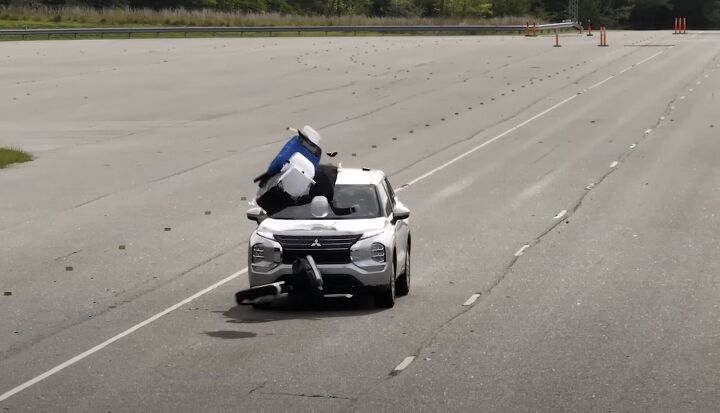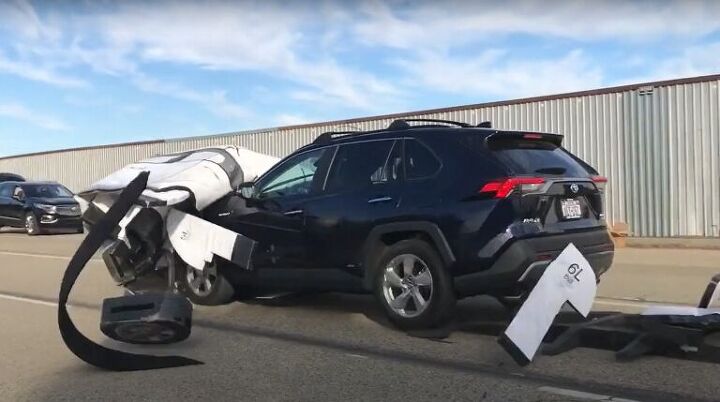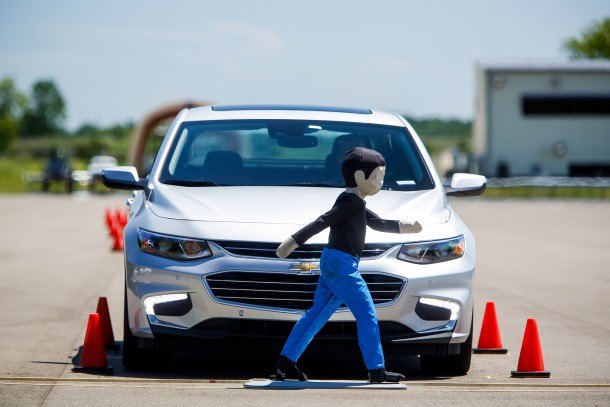#AutomaticBraking
Crash Avoidance Systems Underwhelm in Latest IIHS Study
The Insurance Institute for Highway Safety (IIHS) announced it has updated its vehicle-to-vehicle front crash prevention test to account for higher speeds. Originally, the group was only running tests for things like automatic emergency braking below 25 mph. Now, it’s targeting higher speeds and obstacles of varying sizes. But the results aren’t any better. Out of the 10 small crossovers tested, only a single model garnered a good rating.
Shrewd or Crude? NHTSA Proposes Automatic Emergency Braking Requirements
Last week, the National Highway Traffic Safety Administration (NHTSA) floated the notion that every new passenger vehicle should come with automatic emergency braking (AEB) systems. It would seem that the stage is being set for another mandatory safety inclusion, with the NHTSA targeting universal implementation by the end of the decade. But adding another safety net would come with a few complications, as AEB doesn’t really qualify as a passive system.
Rain or Shine: AAA Finds Out Advanced Driving Aids Still Suck
A new study from the American Automobile Association (AAA) has found that rain can severely impair advanced driver-assistance systems (ADAS). Similar to how highway traffic slows to a crawl when there’s a sudden deluge, modern safety equipment can have real trouble performing when a drizzle becomes a downpour.
On Thursday, the motor club organization released findings from closed-course testing that appeared to indicate some assistance suites had real trouble seeing through bad weather. AAA reported that 33 percent of test vehicles equipped with automatic emergency braking traveling collided with a stopped car when exposed to simulated rainfall at 35 mph. The numbers for automatic lane-keeping was worse, with 69 percent drifting outside the lines. Considering the number of times the people writing for this website have anecdotally criticized ADAS for misbehaving in snow, sleet, rain, fog, or just from an automobile being a little too dirty, it’s hard not to feel a little vindicated.
Center for Auto Safety Asks Nissan to Brake Check Itself
Advanced driving aids have been slighted once again. This time, the Center for Auto Safety is asking Nissan to issue a safety recall on several models it believes have received too many customer complaints about their automatic emergency braking systems.
It also claims the manufacturer is already aware of the situation, after filing an public-information requests that showed Nissan being in possession of more than 1,400 complaints and field reports alleging the systems are activating when they shouldn’t. The company is also on the receiving end of some lawsuits over the matter.
We’d hate to harp on Nissan more than necessary. The manufacturer already has a laundry list of problems it’s hoping to solve, and there’s clear evidence that advanced driving aids are acting goofy across the board — especially as they become more commonplace. Last week, we reported on another AAA assessment encompassing multiple brands that once again showed just how reliable these electronic nannies aren’t.
When Will Automatic Braking Become Standard Equipment?
There was a time when seat belts were considered unnecessary, reserved as an optional extra for motorists who ventured out onto roadways in a state of white-knuckle fear. What pathetic bags of flesh, many thought, wrapping themselves in a polyester harness because they can’t handle themselves on the road — thinking it will save them from the reckoning of sheet metal and glass.
We know better now. Seat belts are proven life savers and advanced restraint systems are compulsory for both automakers and occupants. That will likely be the path of automatic emergency braking takes as well. Nissan announced Thursday it would make auto braking systems standard on a large portion of 2018 models sold in the United States. Toyota is doing the same. But the technology is not yet ubiquitous, nor has it acquired universal public approval. Many worry it could be too invasive or provide a false sense of invincibility, so it could be a while before AEB becomes expected equipment on all new models.
Your Future No Longer Includes Rear-Ending That Other Car
As we reported yesterday, a group of top automakers has agreed to offer automatic emergency braking (AEB) on almost all of their models by 2022.
The National Highway Transportation Safety Administration (NHTSA) confirmed the voluntary agreement today, meaning virtually all light-duty cars and trucks sold in North America will adopt the safety feature by Sept. 1, 2022.
The group is made up of Audi, BMW, FCA US LLC, Ford, General Motors, Honda, Hyundai, Jaguar Land Rover, Kia, Maserati, Mazda, Mercedes-Benz, Mitsubishi Motors, Nissan, Porsche, Subaru, Tesla Motors Inc., Toyota, Volkswagen and Volvo Car USA.
A Group of Automakers is Pledging Automatic Braking For Everyone
In six years, almost every new car sold in the U.S. will come with automatic emergency braking systems, making the relatively new safety feature as prolific as airbags or anti-lock brakes.
A group of 10 major automakers plans to announce tomorrow that they will make automatic braking standard on all of their cars by September, 2022, Reuters reports.
Members of the group, which includes Ford, General Motors, Fiat Chrysler Automobiles, Honda, Toyota and Volkswagen, have been in talks with the National Highway Traffic Safety Administration (NHTSA) and Insurance Institute for Highway Safety (IIHS) for several months as they hashed out a plan.
Automatic Braking Might Be Coming to Your Next New Car, Whether You Like It or Not
Safety technology tends to have a trickle-down journey. ABS, airbags, and other technologies we now take for granted have slowly bee adopted over the years and are now standard equipment. The next technology to join that group might be automatic braking — or autobrake — depending on from what company you buy your next new car.
Ten automakers, along with the NHTSA and IIHS, have agreed to make automatic braking standard on their cars going forward.
Nissan Making Automatic Braking Standard On JDM Models By Fall
Nissan announced Tuesday that it will make automatic braking standard on all of its mass-market models in its home market of Japan.
























Recent Comments